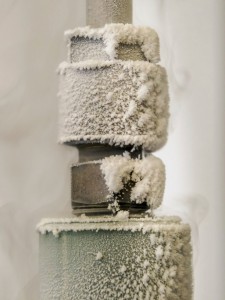It took a bit longer than usual — how about that 65º Maryland Christmas? — but the return of morning windshield frost means that winter is officially here, and that probably means freezing temperatures are here to stay for a while. As handy as your home irrigation system is, it’s important to take good care of it and winterize it well, or it won’t be any good in the spring. Any leftover water in the pipes is liable to freeze, expand, and burst your pipes. Use these methods to ensure the safety of your home irrigation system.
Manual Method
This is the way to go if your home irrigation system has manual valves at the end and low points of the pipes. Shut off water supply, open the valves, check backflow devices, drain any sprinklers that might be attached, and once you’re sure all the water has drained, go ahead and close the valves back up.
Automatic Method
The automatic method applied if you have — you guessed it — automatic valves at the end and low points. These will automatically activate if the pressure inside the pipes is less than 10 PSI. Once you shut off the water supply and activate a station, the system will drain itself. In some cases you may have to combine the automatic method on lateral lines and the manual method on the mainline.
Blow-Out Method
WARNING: Wear eye protection if using this method!! Flying debris can cause serious injury.
This is the method recommended for pipes less than 2” in diameter, and uses compressed air to clear out all remaining water. For this method, shut off the irrigation water supply and, with the compressor valve closed tight, attach an air compressor hose to the fitting. Once this is done, follow these steps:
- Activate the system for the zone or sprinklers that are highest in elevation and the furthest from the compressor.
- Close the backflow isolation valves.
- Slowly open the valve on the compressor to allow air into the irrigation system. The blow out pressure should stay under the maximum operating pressure specification of the lowest pressure rated component on that zone and shouldn’t top 80 PSI under any circumstances.
- Repeat this for each zone in your system, starting from the furthest one from the compressor and working your way slowly toward it.
With each zone ensure that all the water has drained before moving on. This should take about two minutes each. We recommend two or three short cycles per zone instead of one long cycle. Never run the compressor without at least one irrigation control valve open.
It’s important to make sure you properly winterize your home irrigation system so it can be fully functional by the time spring rolls around and everything thaws out. With proper care, everything will flow smoothly on the other side of this winter’s harsh chill. And of course, if you don’t feel comfortable with any of these procedures, or would just prefer to have it professionally done, don’t hesitate to contact us.
Get In Touch With Aqua-Bright Irrigation & Illumination Today
For more information about outdoor lighting for your Maryland home, call Aqua-Bright today at 410-489-9009 or take a tour of our website. We offer top notch irrigation services from seasoned professionals. You can follow Aqua-Bright Irrigation & Illumination on Facebook, Twitter, Google+, and LinkedIn for more updates and information about our illumination and irrigation services! For examples of our work, check us out on Pinterest, too
